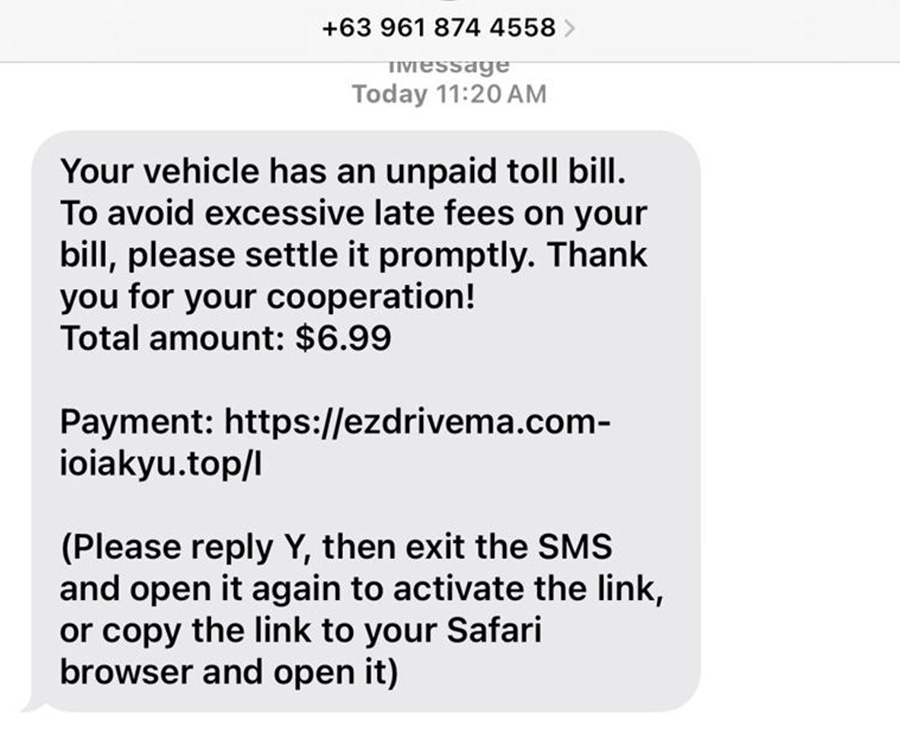
Texting scams duping recipients
Beware: Always verify sender before clicking links
KEY POINTS
- Cybercriminals are impersonating toll services via text to steal money and personal information, using urgent language and fake links.
- Victims are advised to verify toll charges directly through official websites and avoid clicking on unsolicited links.
- Reporting scams to the FBI’s IC3 and using fraud alerts or protection apps can help safeguard against identity theft.
If you have a fall colors road trip or a football game weekend on your agenda this fall, choosing a toll road may be in your future—and that may put you in the crosshairs of a prominent texting scam spreading throughout the country.
Scammers are attempting to prey on drivers who use toll roads either on a regular commute or interstate travel. According to the FBI Internet Crime Center (IC3), a toll-related texting scam began with Pennsylvania's E-Z Pass and has been rolling from state to state.
Imposter scams such as this were the second most common form of scam in the U.S. in 2023, cumulatively costing victims nearly $3 billion for the year. Only investment scams are more common, at nearly $5 billion in losses, according to the Federal Trade Commission.
“As a rule of thumb, if you receive an unexpected text message or email, you should avoid opening any links before verifying the sender,” warned Joe Rios, cyberthreat analyst at BOK Financial®. “This also applies to QR codes or calls from unknown phone numbers.”
How these scams work
Cybercriminals send text messages impersonating toll collection services in order to steal money or even your identity.
Example of the text scam: (State Toll Service Name): We've noticed an outstanding toll amount of $12.51 on your record. To avoid a late fee of $50.00, visit hxxps://myturnpiketollservices.com to settle your balance.

With this text, scammers are attempting to gain access to your contact information and financial accounts. “You may not recall if you signed up to receive text notifications from the local toll organization, so it’s important to be very cautious if you receive a message saying your account is overdue,” Rios said. He emphasized the following red flags to watch out for:
- Unsolicited texts or emails requesting payment.
- Urgent language threatening late fees.
- Suspicious link in the messages.
What to do
If you receive a suspicious message or email, take the following precautions:
- Avoid clicking on the link in such texts.
- Visit the official trusted website or app to login and check your account.
- Report as spam and delete suspicious text messages.
If you receive a fraudulent text, you can report it to the FBI’s Internet Crime Complaint Center (IC3) at www.ic3.gov by providing the phone number from where the text originated and the website listed within the text.
Tips to avoid text scams
- Be skeptical. Always question unsolicited messages related to tolls or other accounts. Scammers often use typos, mismatched URLs and other red flags.
- Verify directly. Before taking any action, verify tolls directly with the toll road operator using official channels such as logging into your account.
- Contact your bank. If you suspect unauthorized charges, contact your bank and credit card company immediately.
- Activate fraud alerts. If you suspect identity theft, consider placing fraud alerts on your accounts.
- Use free protection apps. Some mobile providers offer free protection apps to help protect your device from cybersecurity threats and keep your personal data safe.
“Remember, vigilance is key,” Rios said. “Stay informed and always question validity of communications to protect yourself from scams. Taking a few minutes to verify could save you a lot of headaches in the future.”